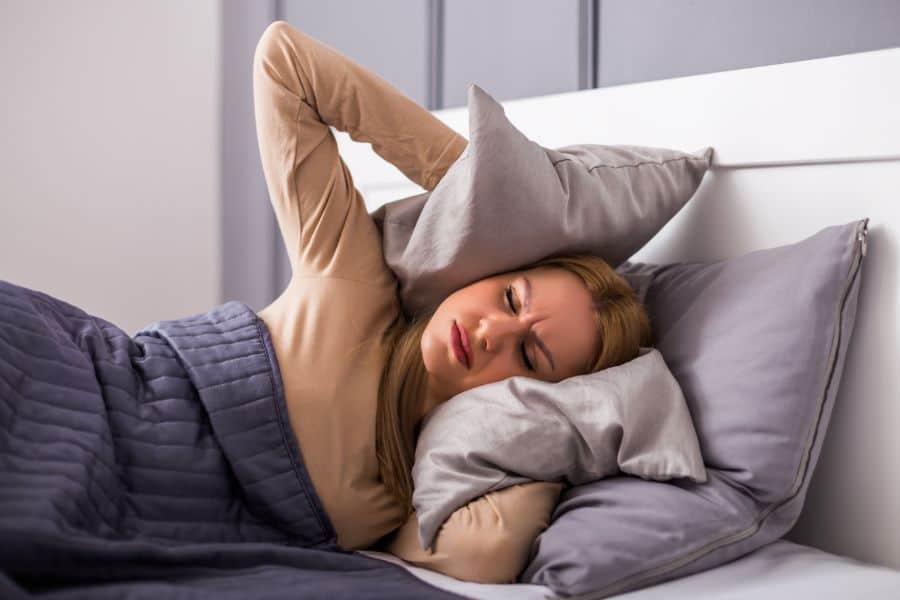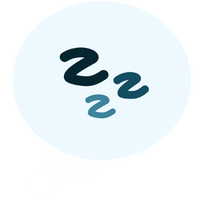Dreaming excessively or having more frequent vivid dreams should not worry you. It is completely normal, and you rarely have to consult a doctor since the dreams typically go away on their own with time.
There are many reasons why you may be dreaming so much all of a sudden. Some causes are psychological, but most are tied to physiological aspects that are easy to self-diagnose and treat all on your own.

However, there are a few cases, like sleeping disorders and hormonal fluctuations, where you must consult a professional.
Read to learn what it means to dream a lot and what that tells you about your physical and mental health. Get to know the causes and remedies of such a condition so that you can go back to getting your beauty sleep in no time.
11 Reasons Why You Dreaming So Much Lately?
Most of our dreams happen when we are in REM sleep. This is a period in the sleeping stages where your eyes rapidly move under your closed eyelids (hence the name Rapid-Eye-Movement (REM)).
In this stage, your brain is the most actively asleep, and your muscles on the legs and arms are temporarily paralyzed, preventing you from acting out your dreams.
However, it is a common myth that dreams only happen in REM sleep. You can also dream in the NREM (non-rapid-eye-movement) sleep stage, but the dreams are less vivid and less memorable compared to ones you have in REM sleep.
With that said, any disruption to any of these stages can lead to irregular sleep patterns that affect how you dream. Meaning that anything that can cause you to drift in and out of sleep will contribute to the increase or decrease of your dreams.
These range from physiological disruptions like medication, sleeping disorders, and drug use to psychological disruptions like stress, anxiety, and poor mental health. Here is a deep dive into why you are dreaming more frequently at night:
1. Sleeping Disorders like Sleep Apnea and Insomnia
Sleeping disorders are conditions that disrupt your normal sleeping pattern. There are more than 80 different types of sleeping disorders, and about 70 million people in the United States suffer from them. The most common ones include insomnia, sleep apnea, hypersomnia, parasomnia, narcolepsy, and restless legs syndrome.
The most common symptom among all of them is that patients feel sleepy and tired throughout the day. Insomnia is the most common, and patients report a persistently unavoidable inability to sleep or stay asleep. Sleep apnea follows suit; it is a breathing disorder where you can stop breathing for a few seconds during sleep.
Narcolepsy, on the other hand, is a sleeping disorder where the patient experiences frequent vivid dreams that can happen during sleep attacks during the day. This is one of the more severe sleeping disorders.
Sleep disorders affect how your brain processes dreams and your quality of sleep. Once your brain gets enough time to get into REM sleep, it is common to experience frequent dreams since your brain is trying to make up for the lost time.
2. Effects of Using Some Medication
Medication and sleep disorders are interlinked in some patients. Your quality and length are easily affected by some medication that you may be using from a doctor’s prescription or over the counter. The chemicals can dysregulate your brain’s sleeping patterns and cause you to dream more or less during REM sleep.
It is important to check in with your doctor or prescription to see whether your sleep can be affected by the medication you are taking. Some examples of such medication include heart medicine, from alpha-blockers for high blood pressure to beta-blockers for chest pains. Some anti-depressants have also been known to cause Insomnia.
Some medications also have emotional side effects, from anxiety to agitation and irritability. These emotional fluctuations can tap into your dreams and cause you to dream more often. You must consult with your doctor to see whether you can get less stressful medication.
3. Effects of Melatonin Supplements
Melatonin supplements are widely used as sleeping aids for those who have a hard time falling asleep. It is becoming a very common supplement to take before sleep, and many young adults are taking it without a prescription or overdoing their dosage.
The effects of melatonin supplements range from dizziness to daytime sleepiness but can include recurrent vivid dreams and nightmares in higher doses.
4. Getting off Medication
The effects of using the sleep-affecting medication can also be the same as when you get off said medication. You may notice that you are dreaming so much all of a sudden when you stop using an insomnia-inducing medication, and your brain readjusts to normal sleeping patterns.
5. Using Substances like Marijuana and Cocaine
Drugs like marijuana have been said to increase the quality of sleep, but recent research says otherwise. Many people confuse THC (the ‘high’ inducing chemical in marijuana) with CBD products (medicinal compound found in weed, non-high inducing).
As much as CBD has many benefits, from lowering anxiety and improving sleep quality, most weed products contain large amounts of THC, which can disturb REM sleep.
Dr. Hans Hamburger, a neurologist and sleep expert, explain that smokers get a sudden surge of vivid dreams since weed suppresses REM sleep, but the dreams come back with a vengeance when they stop smoking.
It is the same story with cocaine, nicotine, and alcohol.
People who drink regularly, especially before going to bed, tend to have irregular REM cycles that disrupt dreams.
Vivid nightmares are a common occurrence in alcohol abusers, and these dreams may get more intense when the drinker quits since the brain is struggling to reacclimate to normal sleeping patterns and brain functions.
6. Poor Mental Health
Poor mental health includes lots of mental illnesses and disorders, from depression to schizophrenia. These illnesses contribute to the overall emotional turmoil and instability that REM sleep is responsible for dealing with.
This can result in reoccurring dreams that are triggered by your brain trying to process emotional stimuli during REM sleep. These dreams get more frequent when you experience short-term reactive events during the day.
7. Lots of Stress and Anxiety
A survey in 2020 during the COVID Pandemic showed that people were dreaming more frequently, nightmares being the most common bizarre dreams during that time. This was credited to longer sleeping hours due to quarantine and also more anxiety and stress caused by the traumatic event.
Stress hormones, cortisol, typically drop when we get enough REM sleep. However, the more stressed we are, the more our emotions are affected by cortisol levels during REM sleep. This makes it either hard to sleep, you wake up more frequently during the night, or you have a spike in your dreams as the brain tries to regulate itself emotionally.
Stressful and anxiety-provoking situations can lead to more intense and frequent dreams since the brain is working harder at resolving the emotional disturbance during REM sleep.
8. Hormonal Fluctuations E.g., Pregnancy
It is very common for pregnant women to experience more dreams, including more vivid dreams. Hormonal changes during this period lead to many emotions and anxiety, all of which are completely normal and common.
Frequent dreams are more common during the early pregnancy days but can occur at any time during the pregnancy. The dreams will vary depending on your emotions and journey during the pregnancy. Some range from excitement dreams to nightmares to sex dreams and fantasies.
9. Taking High Metabolic Foods Before Bed E.g., Spicy Foods
One fact that many people consider a myth is that spicy foods can cause you to have strange dreams. Eating spicy foods before bed has increased your body’s temperature and metabolic rate.
These conditions are not optimal for REM sleep; hence, your body reacts negatively to it, and this can cause you to have strange recurrent dreams out of nowhere. However, it is important to remember that this is always true for everybody since our bodies process foods differently.
10. Not Enough Sleep in The Past Few Days – Sleep Deprivation
Sleep deprivation is linked to many side effects, from serious health problems like high blood pressure, stroke, and depression to daytime sleepiness and dizziness. The more your body is sleep deprived, the harder it works to make up for it, from straining your organs to increasing your dreams.
Yes, less sleep does mean more dreams. The more your body is sleep deprived, the more your sleep intensity increases. You will find yourself craving more sleep which translates to more brain activity in REM sleep hence more dreams which are more vivid and intense.
11. Binge-Watching and Social Media
Your mother was right; you shouldn’t watch TV till late in the night.
Watching TV for more than 2 hours each day has been linked to sleep disturbances. Sleep disruptions are more frequent if you watch anything from a blue light-emitting device 90 minutes before sleep – be it from a TV, laptop, or smartphone. The noise from the devices and lighting in the room can also contribute to sleep disruptions.
Anything that causes sleep disturbances can lead to a phenomenon called REM Rebound. REM Rebound happens when your brain tries to recover sleep after a disturbance, causing the REM sleep stage to occupy a bigger space in your sleep cycle. This REM Rebound causes you to have more vivid and memorable dreams.
Also Read:
- What Your Dreams Are Telling You?
- Why Do I Keep Waking up At 3am?
- Why Do My Dreams Feel So Real Lately?
- Does Dreaming Mean Good Sleep?
What to Do When You Dream A Lot
As you can tell, dreaming a lot is rarely a cause for concern. Most of the causes can be easily solved by having a normal sleep pattern where you get to sleep for about seven to nine hours, getting a minimum of 90 minutes of REM sleep.
Be patient; even the most adverse causes of vivid dreams will go away with time on their own. You can accelerate the process by ensuring you have healthy sleep hygiene.
A good place to start is by reducing caffeine & alcohol intake before bed, watching what you eat before sleeping, and avoiding using drugs like marijuana or ketamine as sleeping aids.
Please ensure you see a doctor if you suffer from sleep disorders and poor mental health conditions that cause frequent dreams.
